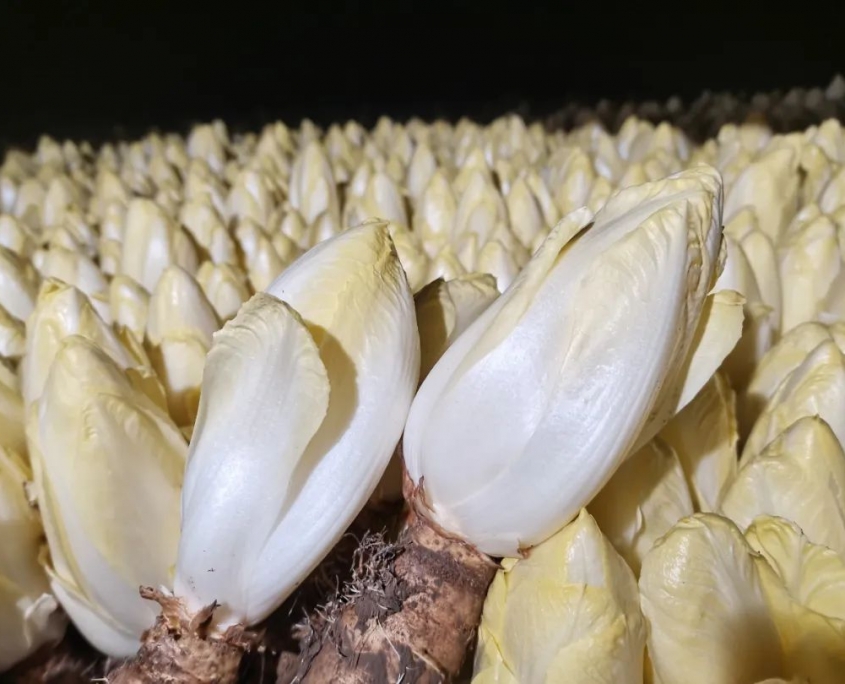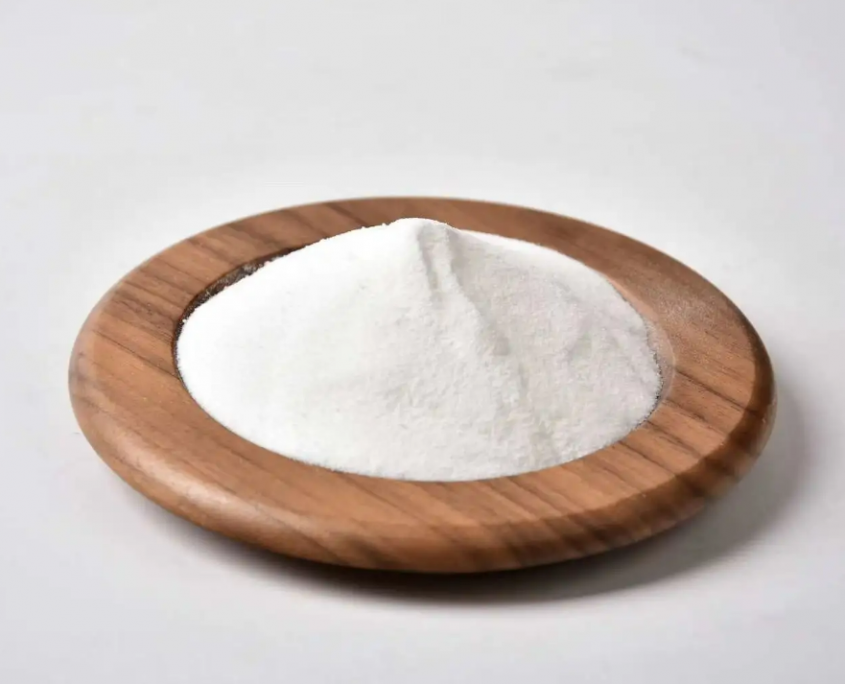Chicory(Cichorium intybus) is a blue-flowered plant native to Asia and Europe. It is a nutrient-rich vegetable with high levels of inulin, a natural soluble dietary fiber that is commonly used in traditional medicines. The root is also rich in minerals, including magnesium and potassium, which help keep the body’s muscles healthy and boost the cardiovascular system.
What’s Chicory Root Extract?
Chicory extract mainly refers to inulin, which is a water-soluble fiber obtained from chicory root after removing protein and minerals through water extraction, ion exchange, membrane filtration, spray drying and other steps. As a food additive, inulin can be found in many processed foods, including bread, pasta, cereals, and yogurt. Inulin is also an ingredient in margarine and salad dressings. It has several health benefits. For example, it promotes healthy gastrointestinal function and is associated with lower cholesterol.
Chicory root extract also contains vitamin C, trace potassium, and manganese, flavonoids and coumarins that have anti-inflammatory and antioxidant effects. They are also believed to have anti-cancer properties. Chicory root can benefit you in a number of ways. It can help you stay healthy, and regulate your appetite, and it can even reduce calorie intake.
Benefits of Chicory root extract
Inulin is one of the most studied prebiotics, and many human trials have shown some good health effects. Among them, there is high evidence (supported by randomized controlled trials in humans) of improving hyperlipidemia, constipation, weight loss, and absorption of trace elements.
Improve blood lipid
In the process of fermenting inulin by gut bacteria, large amounts of short-chain fatty acids are produced. These short-chain fatty acids can improve the body’s metabolism. A systematic review has shown that inulin lowers “low-density lipoprotein cholesterol” (LDL) in all populations; For people with type 2 diabetes, inulin increases HDL levels and helps them control blood sugar. A lot of dietary fiber hunks down fat in the gut and forms a fat-fiber complex that forms in the stool, lowering blood lipid levels.
Improve bowel function
The chicory root extract has been used as a medicinal plant for thousands of years. It is now used as a dietary fiber and has been classified as a prebiotic, known for promoting the growth of healthy bacteria in the gut. This beneficial microorganism helps maintain a healthy intestinal tract and can help to lower inflammation.
It’s also proven to promote the growth of Bifidobacteria in the gut microbiome. Inulin-type fructans (ITF) in chicory root fiber have a bifidogenic effect, promoting the growth of Bifidobacteria in the gut microbiome. It has been shown to increase the bacteria in the large intestine and improve bowel function. Prebiotics are molecules that are selectively utilised by the host microorganisms, thereby contributing to the health of the host. Chicory root fiber also produces short chain fatty acids which are beneficial to the human body.
There are many studies that have been conducted on the effects of the prebiotics on the colon. Nevertheless, there are still questions about the effects of the prebiotics on the bacterial composition in the colon.
Improve constipation
Some studies have found that chicory root is an effective treatment for constipation, a common condition that affects up to 30 percent of the population. Inulin may relieve the symptoms of constipation, helping to improve bowel function. Inulin promotes the growth of bifidobacterium in the gut and reduces the level of cholephilia, thus helping to improve the intestinal environment. Inulin also has better water retention, which can also help with constipation. Several randomized controlled trials have shown that inulin can help improve constipation in children, adults and the elderly. Inulin can reduce the difficulty of defecation, and can effectively increase the frequency and regularity of defecation. In the trial, children were given 4 grams a day; 12-15g daily for adults.
However, while it can improve constipation, inulin doesn’t have a significant effect on bloating or abdominal pain. In fact, bloating is the most common side effect of inulin.
It regulates appetite
Chicory is a good source of dietary fiber and is often found in high-fiber cereals and baked goods. Its main ingredient is inulin, which helps reduce the feeling of hunger. There is some evidence that the oligofructose, or fructans, in chicory roots affect the gut hormones that control satiety. The fiber can be a fat substitute in margarine, salad dressings, and baked goods.
Promote the absorption of trace elements
The soluble fiber helps the body absorb fatty acids and is also a good source of potassium. This helps balance sodium in the body and is important for cardiovascular health. Inulin is one of the dietary fibers that promote the absorption of trace elements. Inulin can effectively promote the absorption of calcium and magnesium. Long-term use of anti-acid drugs (proton pump inhibitors -PPI) is prone to severe magnesium deficiency, and this can be improved by using PPI in conjunction with inulin supplementation (20g daily).
Cancer prevention
Foods that are high in fiber help keep bowels moving and help absorb fatty acids. It can also reduce the amount of “bad” LDL cholesterol in the body. Aside from its ability to support digestion, chicory roots are also believed to have an anti-microbial effect. This makes them beneficial for cancer prevention.
Help lose weight
As a dietary fiber, inulin provides a sense of satiety. Giving obese children 8g of inulin (plus fructooligosaccharide) a daily supplement will help control their ghrelin levels and reduce their appetite. In addition, inulin reduces inflammation in obese people — lowering levels of C-reactive protein and tumor necrosis factor. One study found that chicory root fiber could lower high cholesterol and may help regulate blood sugar levels. It is also thought to help reduce the risk of type 2 diabetes.
Side effects of Chicory root extract
There is no doubt that inulin has many health benefits. But it’s not always so good. In healthy people, excessive inulin intake (more than 0.29g/kg) is prone to bloating and abdominal discomfort. For some people, small amounts of inulin (less than 5g) can cause problems.
Aggravate digestive symptoms
Some people with irritable bowel syndrome (IBS) have a highly sensitive gut for a variety of reasons. For this group, small amounts of gas from the fermentation of FODMAPs can cause bloating, abdominal pain, diarrhea and bowel sounds.
People with digestive problems often cannot tolerate inulin because it produces a certain amount of gas. Therefore, inulin is recommended to be avoided during severe episodes of IBS. In the long term, though, prebiotics is still important for rebuilding gut flora. Therefore, after symptoms stabilize, you can start with a small amount (0.5g).
It may be helpful to supplement your inulin with some anti-bloating probiotics. Lactobacillus Plantarum 299V, for example. If you can not tolerate it, you can choose low hair content of dietary fiber such as galactose oligosaccharide, resistant starch, grass seed shell.
Cause allergy
Although allergy to inulin is rare, cases have been reported. If you find yourself experiencing acute itchy skin, red lips, vomiting, or diarrhea after exposure to inulin, you should consider allergies. Some people report gas, bloating, and abdominal cramping after eating chicory root fiber. If you experience any of these symptoms, it is best to avoid this dietary supplement. You should consult a doctor before using this product.
- Dandelion Extract: What It Is, Benefits, Uses and Side Effect - April 23, 2024
- Is Berberine Extract Help For Weight Loss? - April 11, 2024
- Why Is Pysllium Husk Powder A Popular Meal Replacement Ingredient? - April 3, 2024





